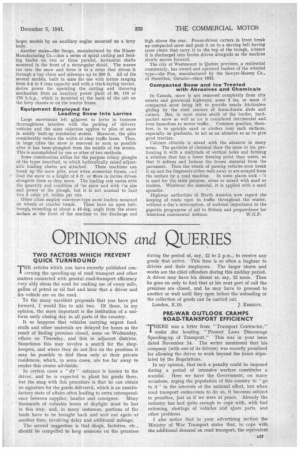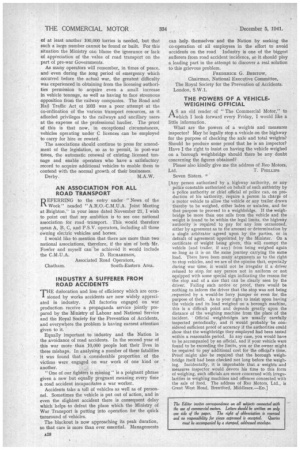OPINIONS and
Page 29

Page 30

If you've noticed an error in this article please click here to report it so we can fix it.
UERIES
TWO FACTORS WHICH PREVENT QUICK TURN RO U ND
THE articles which you have recently published concerning the speeding-up of road transport and other
matters connected with general road-transport efficiency very ably stress the need for making use of every mile, gallon of petrol or oil fuel and hour that a driver and his vehicle are on the road.
To the many excellent proposals that you have put forward, I would like to add two. Of these, in my opinion, the more important is the institution of a uniform early closing day in all parts of the country.
It so happens that vehicles carrying urgent foodstuffs and other materials are delayed for hours as the result of finding premises closed, some on Wednesday, others on Thursday, and this in adjacent districts.
Sometimes this may involve a search for the shopkeepers, and where they do not live on the premises it may be possible to find them only at their private residences, which, in some cases, are too far away to render this course advisable.
In certain cases a " sly " entrance is known to the driver, and he is expected to plant his goods there,
but the snag with this procedure is that he can obtain no signature for the goods delivered, which is an unsatisfactory state of affairs often leading to extra correspond
ence between supplier, haulier and consignee. Many thousands of valuable hours of daylight Must be lost in this way, and, in many instances, portions of the loads have to be brought back and sent out again at another time, involving delay and additional mileage.
The second suggestion is that shops, factories, etc., should be compelled to keep someone on the premises
during the period of, say, 12 to 2 p.m., to receive any goods that arrive. This time is so often a bugbear to drivers and their employers. The larger stores and works are the chief offenders during this midday period. A driver may have his dinner at, say, 12 noon. Then he goes on only to find that at his next port of call the premises are closed, and he may have to proceed to another or wait until they open before the unloading or the collection of goods can be carried out.
London, E.10. J. EMMETT.
PRE-WAR OUTLOOK CRAMPS ' • ROAD-TRANSPORT EFFICIENCY
"THERE was a letter from "Transport Contractor," I under the heading "Present Laws Discourage Speeding-up of Transport." This was' in your issue dated November 14. The writer mentioned that his company (with one of its drivers) was recently penalized for allowing the driver to work beyond the hours stipulated by the Regulations.
In my opinion, that such a penalty could be imposed during a period of intensive warfare constitutes a scandal. Here we have the Government, on many occasions, urging the population of this country to "go to it" in the interests of the national effort, but when road transport endeavours to do so, it becomes subject to penalties, just as if we were at peace. Already the industry has had quite enough to cope with, with fuel rationing, shortage of vehicles and spare parts, and other problems.
I also notice that in your advertising section the Ministry of War Transport states that, to cope with the additional demand on road transport, the equivalent of at least another 100,000 lorries is needed, but that such a large number cannot be found or built. For this situation the Ministry can blame the ignorance or lack of appreciation of the value of road transport on the part of pre-war Governments.
As many operators will remember, in times of peace, and even during the long period of emergency which occurred before the actual war, the greatest difficulty was experienced in obtaining from the licensing authorities permission to acquire even a small increase in vehicle tonnage, as well as having to face strenuous opposition from the railway companies. The Road and Rail Traffic Act of 1933 was a poor attempt at the co-ordination of the various transport resources, as it afforded privileges to the railways and ancillary users at the expense of the professional haulier. The proof of this is that now, in exceptional circumstances, vehicles operating under C licences can be employed to carry for hire or reward.
The associations should continue to press for amendment of the legislation, so as to permit, in post-war times, the automatic renewal of existing licensed tonnage and enable operators who have a satisfactory record to acquire additional vehicles to enable them to contend with the normal growth of their businesses.
Derby. M.A. W. AN ASSOCIATION FOR ALL ROAD TRANSPORT
REFERREFERRING to the entry under " News of the RING " headed " A.R.0.-C.M.U.A. Joint Meeting at Brighton," in your issue dated November 21, I wish to point out that my ambition is to see one national association for road transport. This would therefore mean A, B, C, and P.S.V. operators, including all those ,
owning electric vehicles and horses.
I would like to mention that there are more than two national associations, therefore, if the aim of both Mr. Fowler and myself can be achieved it would include the C.M.U.A. D. RICHARDSON, Associated Road Operators,
Chatham. South-Eastern Area. INDUSTRY A SUFFERER FROM ROAD ACCIDENTS
THE dislocation and loss of efficiency which are occasioned by works accidents are now widely appreci
ated in industry. All factories engaged on war production receive a propaganda service jointly prepared by the Ministry of Labour and National Service and the Royal Society for the Prevention of Accidents, and everywhere the problem is having earnest attention given to it. Equally important to industry and the Nation is the avoidance of road accidents. In the second year of this war more than 10,000 people lost their lives in these mishaps. In analysing a number of these fatalities it was found that a considerable proportion of the victims were engaged on war work of one kind or another.
"One of our fighters is missing" is a poignant phrase given a new but equally pregnant meaning every time a road accident incapacitates a war worker.
Accidents take a toll of vehicles as well as of personnel. Sometimes the vehicle is put out of action, and in even the slightest accident there is consequent delay which helps to defeat the plans which the Ministry of War Transport is putting into operation for the quick turnround of vehicles.
The blackout is now approaching its peak duration, so that care is more than ever essential. Managements can help themselves and the Nation by seeking the co-operation of all employees in the effort to avoid accidents on the road Industry is one of the biggest sufferers from road accident incidence, so it should play a leading part in the attempt to discover a real solution to this grievous problem.
FREDERICK G. BRISTOW,
Chairman, National Executive Committee, The Royal Society for the Prevention of Accidents. London, S.W.1.
THE POWERS OF A VEHICLEWEIGHING OFFICIAL
AS an old reader of "The Commercial Motor," to which I look forward every Friday, I would like a little information.
What are the powers of a weights and measures inspector? May he legally stop a vehicle on the highway for the purpose of checking the axle and total weights? Should he produce some proof that he is an inspector? Have I the right to insist on having the vehicle weighed on a borough weighbridge should there be any doubt concerning the figures obtained?
Please also kindly give me the address of Reo Motors,
Ltd. T. PHILLIPS Seven Sisters.
[Any person authorized by a highway authority, or any police constable authorized on behalf of such authority by a police authority or chief official of police can, on production of his authority, require a person in charge of a motor vehicle to allow the vehicle or any trailer drawn thereby to be weighed. either laden or unladen, and for that purpose to proceed to a weighbridge. If the weighbridge be more than one mile from the vehicle and the weight is found to be within the legal limits, the highway authority is required tp pay for any loss occasioned, either by agreement as to the amount or determination by a single arbitrator agreed upon by the parties, or in default of agreement appointed by the Minister. On a certificate of weight being given, this will exempt the vehicle (and trailer, if any) from being weighed again so long as it is on the same journey carrying the same load. There have been many arguments as to the right to stop vehicles, and we are of the opinion that, especially during war time, it would not be irregular if a driver refused to stop for any person not in uniform or not equipped with some special sign indicating the reason for the stop and of a size that can be clearly seen by the driver. Failing such notice or proof, there would be nothing to inform the driver that the stop was not being requested by a would-be lorry jumper or even for the purpose of theft. As to your right to insist upon having the vehicle and its load weighed on a borough machine, this is a difficult point and depends greatly upon the distance of the weighing machine from the place of the incident. Official weighbridges are usually carefully inspected periodically, and it would probably be considered sufficient proof of accuracy if the authorities could show that the weighbridge they employed had been tested within a reasonable period. In any case, you would have to be Accompanied by an official, and if your vehicle were found to be exceeding the limits, you or the owner might be required to pay additional cost for the official's time. Proof might also be required that the borough weighbridge itself bad been checked not long before the weighing. Incidentally, it is improbable that a• weights and measures inspector would devote his time to this form of weighing, such officials are more concerned with irregularities in weighing machines and offences connected with the sale of food. The address of Reo Motors, Ltd., is Great West Road, Brentford, Middlesex.—En.}




















































